Political Theatre in Russia in the Year 2014 - Theaterbrief aus Moskau
Let's talk about faith
by Pavel Rudnev
Moscow, 3. July 2014. Art and the government are in a state of war in today's Russia. The government doesn't know how to control the artists and the artists are incapable of communicating with the government, mostly because there are no proper channels for discourse between the two. The ideological censorship of the final years of perestroika gave way to the lawlessness of the 1990s, throwing the artistic marketplace into chaos. An economic censorship was introduced in the 2000s that will surely be remembered as a gift by theater-makers, being soft and more easily surmountable than aesthetical censorship. However, in the 2010s, it proved to be insufficient; the liberal attitude of the theaters as well as the social criticism of the avant-garde movement began to be perceived by the authorities as an attack on those in power. As a result, culture is now in the crosshairs. It is difficult to foresee where this process will lead us, but today it is important to answer one question: Is there such a thing as aesthetical political theater in Russia in our time?
Probably not. To be sure, a few political motifs have appeared in the arts scene over the course of the last ten years, but nothing more. Society does not see theater as a translator of political ideas. The government is only interested in an appealing aesthetic applicable to the course it has chosen. Of course, the concept of political "suggestions" by theater-makers is, on the whole, a strange one anyway. Naturally, the more radical artists in contemporary theater hold a more liberal world-view which one can see in their work – views that are most of the time chaotic. We can also say with complete certainty that political notes in the theater are visible only in the cultural world of the capital cities.
Unused literature
Examples: One may recall the show "The Flight of Mashraba" performed in the Ilkhom Theater in Tashkent; a poet-downshifter from the middle-ages gets into an existential dispute with the Sheikh, where the Sheikh figure (avidly defending centralized government and absolute power) very much resembles the current leader of Uzbekistan. It is generally accepted that this artistic decision cost the director, Mark Weill, his life; he was killed under mysterious circumstances in 2007, a year after the premiere. The show, however, is still on.
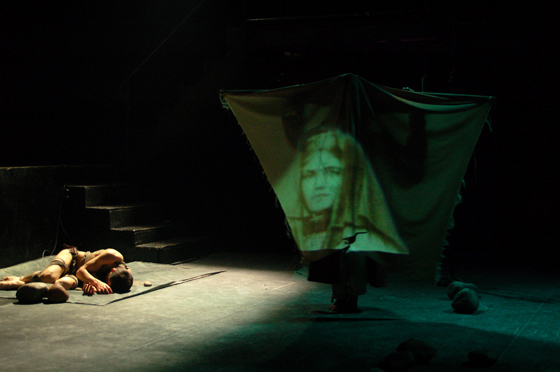 "Flights of Mashrab" by Mark Weill (2006) © Olga Fedina
"Flights of Mashrab" by Mark Weill (2006) © Olga Fedina
The strongest political focus is visible in the "documentary theater" movement (examples include Teatr.doc, The Joseph Beuys Theater, or the documentary program of the Baltic House Theater in St. Petersburg). This is, of course, expectable, but also problematic, as the performances represent identities and ideas that have already been formulated. The "political = documentary" equation does not allow for the development of political satire or the genres of political review or farce, which (and this we can say for sure) do not exist on the Russian theater map (for example, the farce "BerlusPutin" in teatr.doc was a political show, but it would be difficult to call it "aesthetical" or "artistic"). However, new literature currently being written gives us such material to work with; the question of its success lies only in the boldness of the director. But the tradition of Vladimir Sorokin (who appeared first in dramaturgy and then later in prose!), unfortunately, has not been taken on by theater makers. The theater has a great debt to pay to this kind of literature.
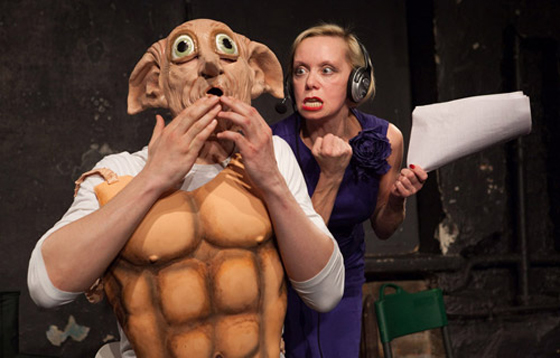 Teatr.doc's "BerlusPutin" © Полина Королева / Театр.doc
Teatr.doc's "BerlusPutin" © Полина Королева / Театр.doc
It is also curious that if liberal political ideas have at least somehow pierced the sphere of theater, anti-liberal ideas are almost nowhere to be seen. Conservative and centrist theater forces for some reason have not yet proposed any alternatives. For example, religious themes and the church are so taboo in Russian theater that there are very few plays and shows with an anti-church theme – but there are also very few shows about the affirmation of faith.
The beginnings and high points of political theatre
There are noticeable anti-liberal notes expressed by the elders of Russian theater. Yuri Lyubimov in his production of "Demons" at the Vakhtangov Theater speaks about the pointlessness and lack of creativity of the Russian spirit of revolution by staging Dostoevsky's novel using only caricatures. Valery Fokin's Liturgia Zero after Dostoevsky's "The Gambler" at the Aleksandrinsky Theater shows how the energy of roulette, the passion, the excitement about it have not vanished from our time. Now, the exact same feelings are prompted by the idea of a healthy lifestyle and ecological tourism. But these shows represent the limit of anti-liberalism in the theater.
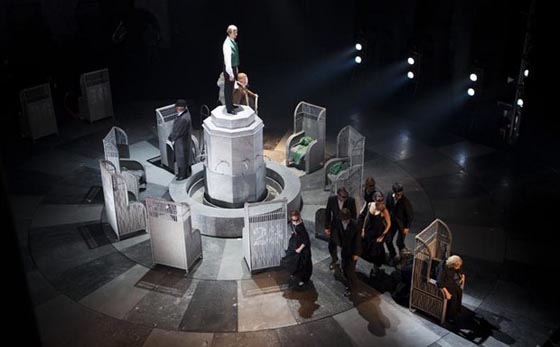 Life's a game of roulette: Valery Fokin's Dostoevsky-adaptation "Liturgia Zero" in St.
Life's a game of roulette: Valery Fokin's Dostoevsky-adaptation "Liturgia Zero" in St.
Petersburg © Ekaterina Kravtsowa
It is commonly held that political theater began in post soviet Russia with Kirill Serebrennyakov's production of "The Forest" at the Moscow Art Theater in 2004, where Gurmyzhskaya and Bulanov made their final appearance in make-up resembling Alla Pugachova (pop-star № 1 in Russia) and Vladimir Putin. This decision in the concept of the show signified the beginning of a new era of "nostalgic-panopticum"; a combination of the traditions of Brezhnev's Stagnation and the simple popular Russian Chanson, i.e. ugly vulgar pop-culture. It was at that moment, long before Russian politics took their "swing to the right", that the revisionist tendencies of the authorities were – aesthetically! – foretold.
The most dramatic and political production of the past decade has been "1:18" at Teatr.doc; a half documentary, half fictitious account of the last hours of the incarcerated lawyer Sergey Magnitsky. The resonance around Mikhail Ugarov and Yelena Gremina's show, which rose to an international level, certainly influenced the reception of the "Magnitsky Act" and made the story public beyond newspaper pages. Another important show was "September.doc", performed at the same theater – the only show in Russia about the tragedy in Beslan pieced together from different positions out of the blogosphere. On a sidenote, the show was accused of having a pro-Islamic agenda in Russia – and of having a pro-Russian agenda while on tour in Europe; maybe the ultimate proof of its objectivity.
Most new drama comes from the provinces
Mikhail Patlaosv's production of "Antibodies" in the Baltic House Theater also received considerable attention; in this show, two opposing sides speak about St. Petersburg as focal point of the escalation of fascist as well as anti-fascist movements. The overall intonation of the show represents Russia as a country of colossal social inequality, as well as social fermentation and unrest. "Antibodies" illustrates an extreme time of trouble in the documentary-style portrayal of a young generation, ready to make personal sacrifices for their own individual understanding of the betterment of society.
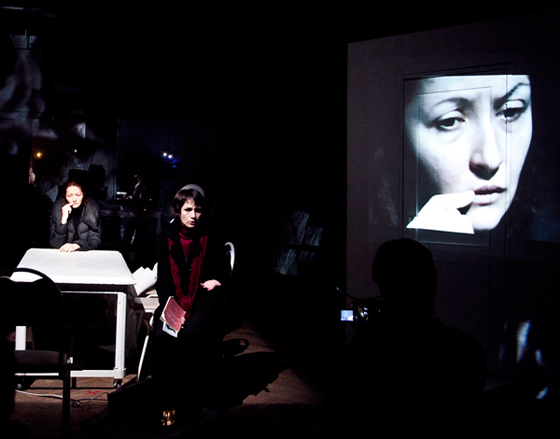 "Antibodies" by Mikhail Patlaosv © Baltic House Theatre
"Antibodies" by Mikhail Patlaosv © Baltic House Theatre
It is more or less the same idea that Kirill Serebrennyakov discussed more radically in his production of "The Frost-Bitten Youth" with Studio Seven. In that show (based on a story by Prelepin), a revolutionary generation imagines fighting against the regime as a potential sacrifice for future social cataclysms; this same generation will be shot in the whirlwind during (and by) the shift to the right.
Contemporary dramatic writing in Russia often expresses itself in the genre of dystopia. Many new plays seem to be direct results of social conflict; interestingly, most new drama comes from the provinces, written by individuals who have first-hand knowledge of their subject. This is exemplified in Vyacheslav Durnenkov's "Exponents" and Natalia Moshina's "Ricotta Island", plays that define Russia as an unconquerable, forbidden, illogical country where any social experimenting is drowned in the mysticism, viscosity, and waywardness of the Russian soul.
The provocative potential of national anthems
There are also two artists who allow political themes to enter their creative motifs. The first is Nikolay Kolyada from Ekaterinburg, who uses the plays of Shakespeare, Pushkin, and Gogol to illustrate Russia as a country raped by officials and the government. In "Boris Godunov", the silent population is represented by a generation of nesting dolls (matreshka) presented on a khokhloma-design tray, given to the tsar as a gift to do with as he pleases. In "The Inspector General", a crowd of Gogolian officials mixed with prisoners and church-goers joyfully stomp around in the muck, trampling to death plants that had been planted there by pitiful autistic women. The second is Vladimir Pankov. In "Dok.tor" he speaks about the poverty and futility of the abandoned Russian provinces, about the de-humanization of a man separated from his dreams. In the production "I am the Machine-Gunner", he deals with the virus of terrorism that has become the norm for everyday Russian life. In "The Underpass", a group of actors stands on the proscenium and sings a fusion of the three Russian national anthems; the Tsarist, the Stalinist, and the contemporary anthem (which has the same melody like the Stalinist but different words, albeit written by the same communist poet). The words and the melodies blend seamlessly. The performance had a very provocative effect on the audience; some individuals in the house actually stood up to leave during the first few musical bars, but soon took their places again, struck by the colossal irony of the theatrical gesture.
There's more to the political theater scene, though, such as the "The Weight of Silence" and "Grandchildren. Act Two" series by Mikhail Kaluzhsky at the Iosef Bois Theater and Sakharovsky Center. Here, the artists challenged Russia to pay more attention to its memory. The shows were structured around the voices of the relatives of war and partisan criminals from Germany and Russia. Two countries, both having survived the traumatic experience of totalitarian regimes, are shown to "utilize" their difficult memories in different ways. As we move further into the future, the past is gradually more and more illuminated. Asking if this process is indeed a good one, and how do we heal the festering wounds of the past, the shows tried to work with the "drama of memory".
Russia's role as cultural center of the region
In Konstantin Bogomolov's production of "The Elder Son" at The Tabakov Theater Studio, Alexander Vampilov's Soviet drama is used to convey the inevitability of the Soviet "fathers" coming to terms with their post-soviet "children" through a feeling of spiritual kinship and religious forgiveness. Bogomolov's last two productions caused very real scandals with political overtones: In "An Ideal Husband" and "Karamazovs" at the Moscow Art Theater, the director used the genre of political farce and social satire to openly discuss some of the most painful topics of contemporary Russia without any masks or sense of illusion; the involvement of the Church in the worlds of the political and the criminal, and the hypocrisy and amorality of a government which claims to promote morality in society.
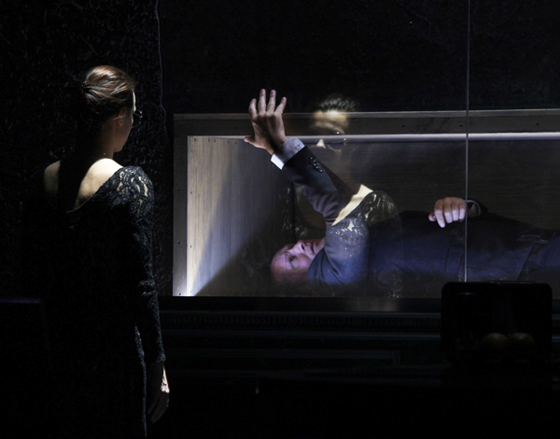 "Die Karamazovs", Moscow Art Theatre © MAT
"Die Karamazovs", Moscow Art Theatre © MAT
Characteristically, Russian theater thrives in times of political disunity. In the 2010s, it has become clear that the Russian theater establishment is ready to use its abilities and its market-audiences to make the cultural achievements and heritage of the former Soviet republics accessible to the world. The important geo-political status of Russian theatre is shown by the fact that Ukrainian, Belorussian, Central Asian, and Caucasian theatrical and dramaturgical phenomena find success more often in Russia than in their own countries with their extremely weak infrastructures.
In this regard, the production of "Akin-Opera" at Teatr.doc obtains a special significance. The show is performed by actual Tajik migrant workers, employed in low-pay jobs in Moscow. During the course of their story, it becomes clear that in their Soviet past, they were humanitarian workers, artists, or teachers. In this way, the theater gives them a chance for professional rehabilitation, and reminds us all that politics can turn any of us into a refugee.
All English texts on nachtkritik.de are listed here.
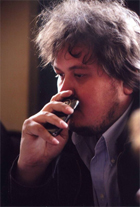 Pavel Rudnev, Moscow, theatre critic and theatre producer. Born in 1976. Graduated from Russian Academy of Theatre Arts in 1998 as a theatre researcher and critic. Works for Moscow Art Theatre and Moscow Art Theatre School as special project producer. Was artistic director of Moscow Meyerhold Center 2005-11, the first open venue in Russia. Has, from 1995 on, published more than 1000 articles on contemporary theatre and drama, also several books. Specialized in new Russian playwriting as a manager, expert and producer. Translated about 20 plays from English into Russian (MacDonagh, Ravenhill, Panych, etc). He gives courses on theatre reviewing in Russian Academy of Theatre Arts.
Pavel Rudnev, Moscow, theatre critic and theatre producer. Born in 1976. Graduated from Russian Academy of Theatre Arts in 1998 as a theatre researcher and critic. Works for Moscow Art Theatre and Moscow Art Theatre School as special project producer. Was artistic director of Moscow Meyerhold Center 2005-11, the first open venue in Russia. Has, from 1995 on, published more than 1000 articles on contemporary theatre and drama, also several books. Specialized in new Russian playwriting as a manager, expert and producer. Translated about 20 plays from English into Russian (MacDonagh, Ravenhill, Panych, etc). He gives courses on theatre reviewing in Russian Academy of Theatre Arts.
Für Horizonterweiterung
Der Blick über den eigenen Tellerrand hinaus ist uns wichtig. Wir möchten auch in Zukunft über relevante Entwicklungen und Ereignisse in anderen Ländern schreiben. Unterstützen Sie unsere internationale Theaterberichterstattung.
meldungen >
- 27. April 2024 Theater Rudolstadt wird umbenannt
- 26. April 2024 Toshiki Okada übernimmt Leitungspositionen in Tokio
- 26. April 2024 Pro Quote Hamburg kritisiert Thalia Theater Hamburg
- 25. April 2024 Staatsoperette Dresden: Matthias Reichwald wird Leitender Regisseur
- 24. April 2024 Deutscher Tanzpreis 2024 für Sasha Waltz
- 24. April 2024 O.E.-Hasse-Preis 2024 an Antonia Siems
- 23. April 2024 Darmstadt: Neuer Leiter für Schauspielsparte
- 22. April 2024 Weimar: Intendanz-Trio leitet ab 2025 das Nationaltheater


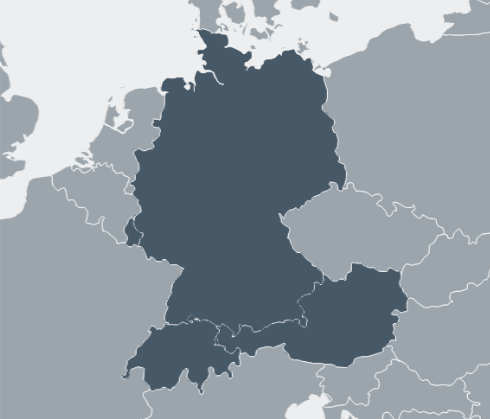
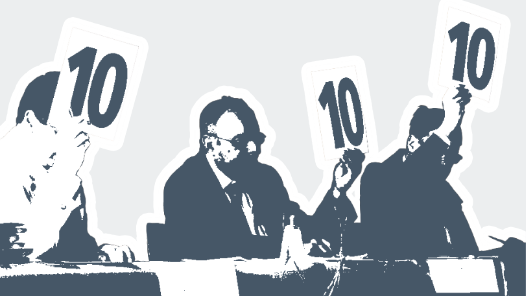
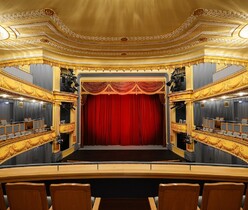



neueste kommentare >